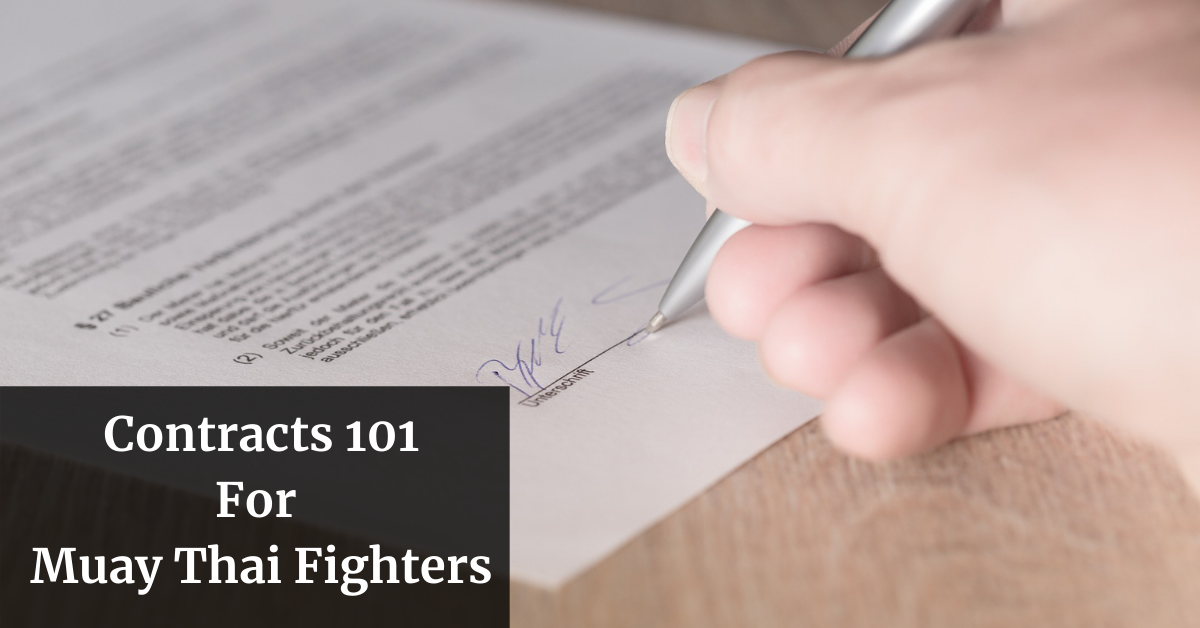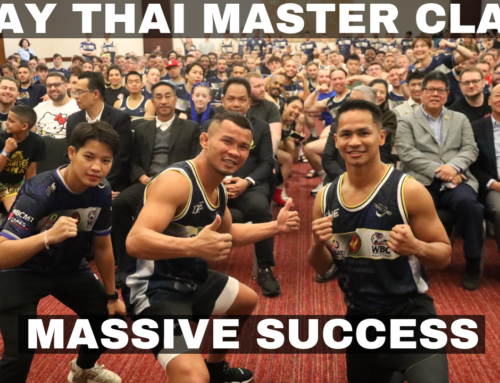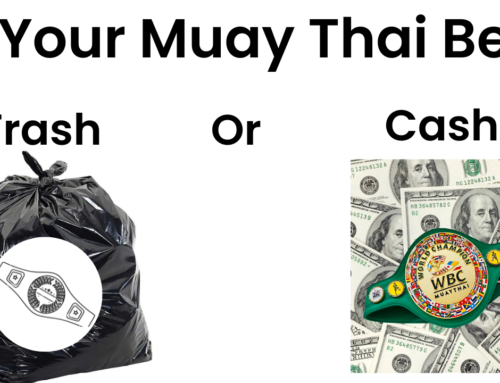Contracts 101 for Muay Thai Fighters
Getting signed by a big promotion can make your career as a fighter. It can launch you to the next level, get you instant notoriety, and hopefully get you paid!
But what exactly are you signing?
In an ideal world, your lawyer would review the agreement. He or she would meticulously walk you through every line, including that tricky fine print, and explain every detail. But if you’re the typical fighter, you probably don’t have the resources to pay to hire a lawyer.
So here are a few basic concepts that can help you understand the contract process.
This article is not meant to cover everything you need to know, and I would strongly recommend that, if possible, you hire a lawyer. But hopefully this article is a good starting point.

What is a contract?
A contract is a legally binding agreement.
It is entered when an offer is accepted. Typically, this offer will take the form of the contract that the promotion sends you (the fighter). In other words, the contract is the offer.
You accept the offer by signing the contract. There are several other requirements to make a contract binding and enforceable, but for practical purposes, the deal is done once you sign.
But if instead of signing you make a change to the contract (e.g., you make a handwritten edit), it is treated as if you’re rejecting the offer. This is referred to as a counter-offer. So if you cross out a provision, and then sign and return the contract, the promotion can say that you rejected the offer.
As a practical matter, you should speak to a representative of the promotion before the promotion sends you something in writing. Make sure to use that opportunity to get as much information as possible. It doesn’t hurt to ask him or her to walk you through the promotion’s standard contract. This will give you the chance to flag any issues before you actually get the contract.
This suggestion leads me to the next point.
Get it in writing!
As a general rule, contracts may be either oral or written. But as a practical matter, all major fight promotions will send you a written contract.
This bring us to the parol evidence rule. The parol evidence rule holds parties to the written contract and prevents them from relying on “extrinsic” evidence (e.g., verbal promises, emails, instant messages, etc.) that contradicts, modifies, or varies the written terms. Simply put, the parol evidence rule makes it very difficult to enforce promises that are not written in the contract.
Separately, almost every fight contract will have an integration clause—usually at the end in a section titled “Entire Agreement” or “Integration.”
The integration clause typically says that the written contract supersedes all prior representations. In practice, this means that if it’s not in the contract, it’s not part of the deal.
If there is something you negotiated or something the promotion promised you, make sure it is in the contract! If it’s not, it probably won’t be enforceable. That means you are not going to be able to do much if the promotion does not make good on its promise.
This dovetails with my next suggestion.

Read and understand the contract.
Read the contract before you sign it. It seems pretty obvious, but you’d be surprised how often people sign agreements without reading them—think of those Terms and Conditions on your last iOS update. As a professional athlete, you should consider it part of your job to read every word of your contract.
Just as important, make sure you understand what you read before signing. Once you sign, you cannot back out of the contract because you didn’t read it or because you didn’t understand the terms.
A contract is interpreted (and enforced) according to the intent of the parties. Generally, the parties’ intent is determined by the meaning of the words in the contract. But it isn’t always that simple. Words can have more than one meaning, and contract language can be confusing.
As a general rule, if you do not understand something after reading it two times, it’s probably unclear. If something is unclear, get clarification and, if necessary, ask the promotion to re-write the provision. A good contract should use simple words and phrases, and should get the point across clearly.
It’s not uncommon for a party to make handwritten changes to a contract. Just keep in mind that the promotion may not accept your changes—see the discussion above on counter offers. So before making changes, you may want to reach out to the promotion to get on the same page.
With that background, let’s go through some of the basic sections of a standard contract.

Parts of a Standard Contract
Contracts usually start with a document title. The title should succinctly state the purpose of the contract. This is typically something along the lines of “Promotional Agreement.”
The title is usually followed by a preamble. The preamble includes the date of the contract. It also provides the promotion’s name and address, and names you (the fighter).
The preamble also typically provides a shorthand name for each party. For example, the promotion may be defined as “Promotion” and you may be defined as “Fighter.” This means that wherever the contract uses the term “Fighter,” the contract is referring to you, the fighter.
Next, the typical fight contract includes several recitals. The recitals provide background information and express the intent of the parties (e.g., they express why the parties are entering into the contract).
Typically, the recitals take the form of “Whereas” clauses. For example, the recitals may state: “Whereas the Promoter wishes to promote the Fighter; and Whereas, the Fighter wishes that the Promoter promote his or her future fights.”
The “Whereas” clauses may be followed by something along the lines of:
“NOW, THEREFORE, in consideration of the mutual promises and agreements hereinafter set forth, and of other good and valuable consideration, the receipts and sufficiency of which are hereby acknowledged, the parties hereto agree as follows.”
This is typically the first time the term “consideration” comes up in the contract. To be valid and enforceable, a contract must be supported by consideration.
Consideration is the benefit that each party gets or expects to get from the contract. For example, the fighter may get X number of fights and receive Y number of dollars. Conversely, the promotion may get the exclusive right to the fighter’s services as a fighter.
This leads us to the specific terms of the contract.
Typically, a fight contract will provide the promoter the exclusive right to arrange fights for the fighter for a specific period of time and/or for a specific number of fights. This means that for the period of exclusivity you can only fight in bouts arranged by the promotion. In exchange, the promotion usually agrees to get the fighter a certain number of fights during that time period.
Nonetheless, the contract probably gives the promotion wide latitude in what it means to “get” you a fight. The contract may provide that the promoter does its job merely by making you a “bona fide” offer to fight, whether or not a fight actually happens.
You should keep this in mind, because you may end up with fewer fights than you thought. An injured opponent or an opponent not making weight may mean a cancelled fight, and may mean one less payday under the contract.
Next, the contract will probably address your fight purse. It likely provides that you will get paid X amount per fight. But typically the contract is silent on when and how you will get paid.
This can be a problem if you’re expecting to get paid right after your fight. A promotion may take weeks or longer to actually pay you. This is not always the promotion’s fault. Fighting is a cash-on-hand business, and the promotion may be waiting to get paid to then pay you.
This can be an issue if you’re counting on that money for your fight expenses (e.g., travel, corner man, etc.). So you should at least plan accordingly. To the extent possible, you may want to add something to the contract requiring the promotion to pay you at least part of your purse immediately after your fight.
The contract will probably next address each party’s responsibility in promoting an individual fight. It is a bit beyond the scope of this article to go over everything that may be included here, but one thing to keep in mind is the issue of your image and likeness.
The contract may provide that you are giving the promotion a license to use your image and likeness. This makes sense, after all you want the promotion to blast you all over social media.
But be careful what you sign. An aggressive contract may provide that the promotion has the exclusive right in perpetuity to your image and likeness. For practical purposes, this may mean that the promotion owns your image forever.
This can be a serious problem if you want to fight for another promotion, open your own gym, or otherwise commercially use your image. To the extent possible, make sure to put reasonable limits on the promotion’s rights to your image.
The last few pages of the contract will probably address several issues, including Representations and Warrantees, Governing law, Confidentiality, Severability, the Integration Clause, Notices, and other boilerplate.
Again, a deep dive into these sections is beyond the scope of this simple article. But one thing to keep in mind is the Governing Law section. It likely provides that any issues arising out of the contract must be litigated in the promotion’s home state.
This means if the promotion breaches the contract, you may have to travel to another state to sue it, assuming you’re not in the same state. This provision may make it difficult, if not impossible, to enforce the contract in court. How many of you have the money to sustain a lawsuit, let alone one that is potentially 100s of miles from where you live?
Because of the promotion’s bargain power, you may not be able to do much about this issue. But you should at least be aware of this potential hurdle.

Conclusion
Understanding the basics of contracts is a crucial first step in protecting your interests as a fighter. Hopefully, this article has helped with that first step.
But keep in mind, there are more potential pitfalls than I could ever hope to cover in an article. So if you take one thing from this article, it should be to do your own due diligence; this diligence should include reading and understanding a contract before signing it. Also, there really is no substitute for experience. So if you have the money, hire a qualified lawyer.
Chok Dee (Good luck)!
This article has been prepared for informational purposes only and is not legal advice or a substitute for legal counsel. The information in this article is not intended to create, and receipt of it does not constitute, an attorney-client relationship. You should not rely or act upon this information without seeking professional counsel.





